 Iran’s Attack on Israel
Iran’s Attack on Israel
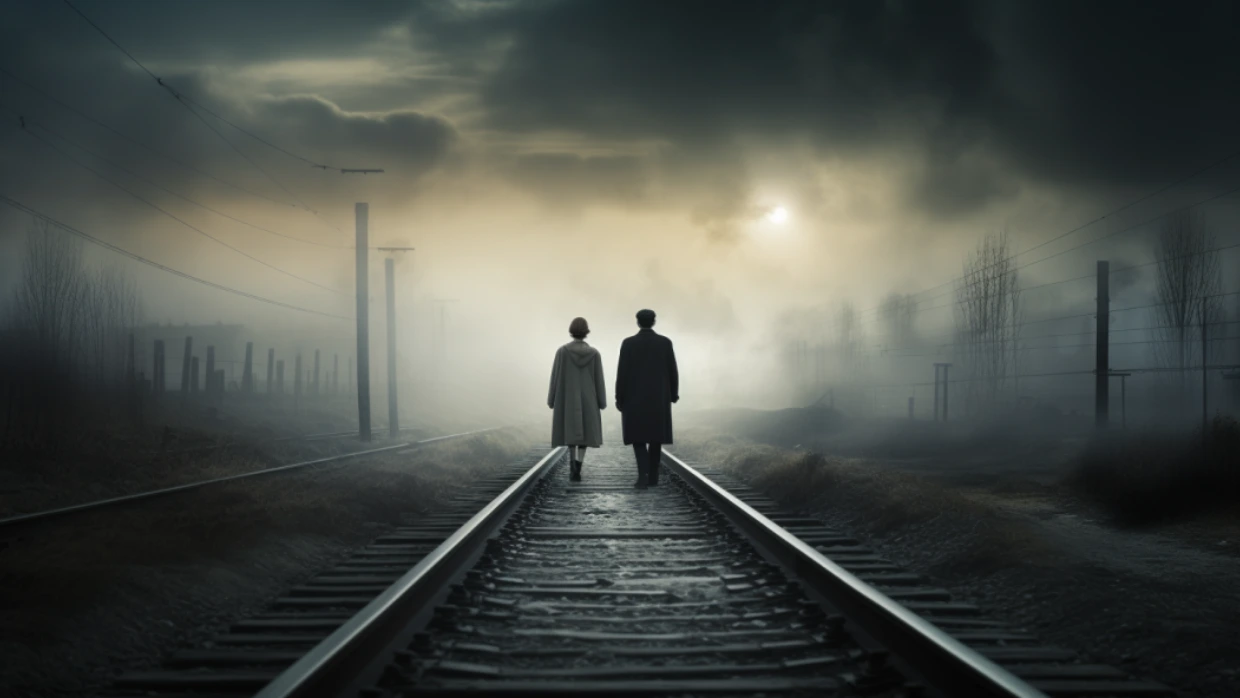

8 min read
A new book uncovers the almost-lost story of hope during the darkest of times.
David Wisnia, a clean-shaven, 17-year-old, stood in the building the SS called the Sauna, where he disinfected the clothing of new arrivals. It was the only warm place in the entire camp. It was winter in Poland, and David’s thin, striped uniform was not enough to shield him from the brutal temperatures outside.
Across the room, he saw a girl. She was petite, at 4 feet, 11 inches, with thick chestnut colored hair and deep-set brown eyes. She moved with confidence and self-assurance that was rare in these parts.
David felt a fluttering in his stomach. She held her glance on him, and he knew: she liked him, too.
The girl, Zippi Spitzer, didn’t know that love was possible in this place. They were surrounded by darkness – two Jews rounded up and sent to Birkenau, the deadliest camp in Auschwitz, the place where hope dies.
But now it was coming back to life.
This is the beginning of “Lovers in Auschwitz: A True Story” (Little, Brown), a new book by author Keren Blankfeld, the grandchild of four Holocaust survivors. The author, who teaches at Columbia Journalism School, wrote a piece called, “Lovers in Auschwitz, Reunited 72 Years Later” for the New York Times in 2019; that piece went viral, and now, the full story is in book form.
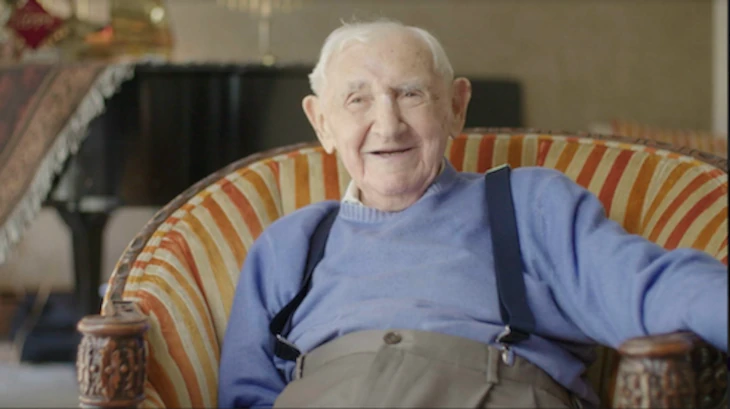 David Wisnia
David Wisnia
The new book details the true story of David Wisnia and Zippi Spitzer, two young people who met in Auschwitz and were instantly enamored when they saw each other at the sauna, one of the worksites at the camp.
The two embarked on a secret romance, passing each other notes and arranging private meetings with one another. Miraculously, both of them survived, but they were separated after the camp was liberated.
At Zippi’s deathbed, they were finally reunited 72 years later. There, David asked Zippi: Did you save my life?
Blankfeld first met David researching refugees who’d arrived in the U.S. around World War II in unusual circumstances. She sat down to interview him and learned his fascinating story. The young man survived a death march and Auschwitz, where he sang for the Nazis as part of his job, and he was adopted by an American military unit.
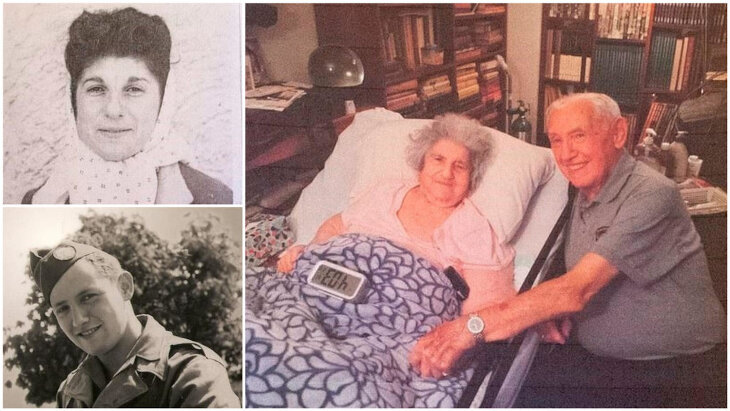 David and Zippi reunited after 72 years.
David and Zippi reunited after 72 years.
“He joined the unit toward the end of the war, was given an American uniform and took on an informal role as an interpreter,” the author said. “He’d transformed from being a Nazi prisoner to a soldier interrogating Nazis.”
As Blankfeld was wrapping up the interview with David, he casually mentioned that he had a girlfriend in Auschwitz.
“A girlfriend in Auschwitz? I was stunned,” she said. “How was this possible? I sat back down as he recalled the days when he fell in love with Zippi, a fellow Auschwitz prisoner, an extraordinary woman.”
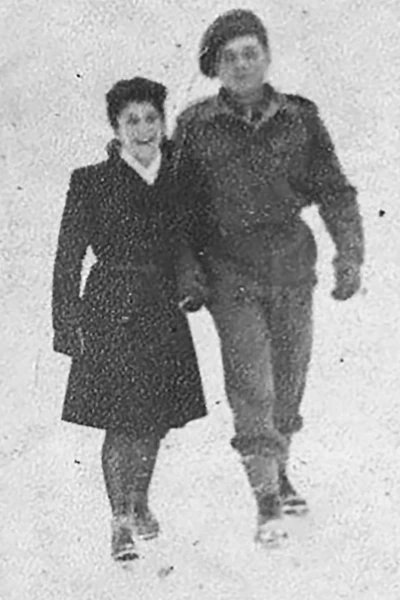
Zippi had been the only woman stationed in the prisoner intake area, where she met David. While David was a Polish Jew from the Warsaw Ghetto, Zippi was a Jew from Slovakia. She was a great talker and had made connections with all sorts of prisoners and guards as her plan to survive the tragic situation. Her job was to paint the stripes on the women’s uniforms, and eventually, she worked her way up to being an assistant and graphic designer for those in charge of the women’s camp.
She used her position of power to help others, including hiring unhealthy prisoners to work in her office so she could save them, and making copies of camp diagrams and rosters in secret to hopefully utilize them to persecute the Nazis after the war was over. She was unofficially a member of the underground resistance, but she would try to keep a distance so as not to be caught.
Zippi had many brushes with death. One time, she accidentally stumbled upon Josef Mengele, the “Angel of Death,” who was making a selection and choosing his next victims. Blankfeld writes:
“Zippi saw Mengele before he noticed her. She came to a halt and quickly averted her gaze. By the time he spotted her, she had already started to inch away.
Hey, you! he called. Where are you going?
Zippi looked straight ahead, continuing to exit the room. She was well-dressed; she wasn’t a common prisoner, she told herself. Surely he saw that; surely she’d be safe. But she also knew that this was someone who casually castrated boys and drugged children, leaving them to writhe in pain until their deaths. Zippi told herself to remain calm. No matter what, she couldn’t betray her fear.
Hey! Mengele called again.
She had to get out of there. As she hastened away, she heard someone tell Mengele that she worked at the camp office. Mengele had been running; now, he gave up the chase. Once again, she’d survived by a slender thread of chance.”
In between cheating death, Zippi and David would pass each other notes and meet once a month in secret. David, who was captivated by Zippi, said he felt special: “She chose me,” he told Blankfeld.
At these meetings, which were guarded by fellow prisoners, they didn’t talk very much, but they did give each other a glimpse into their life before the camp. David’s father loved the opera, and this sparked a love of singing in David. Everyone in David’s family died in the Warsaw Ghetto. Zippi played the mandolin and piano and loved music, just like David. She only had one surviving family member, a brother.
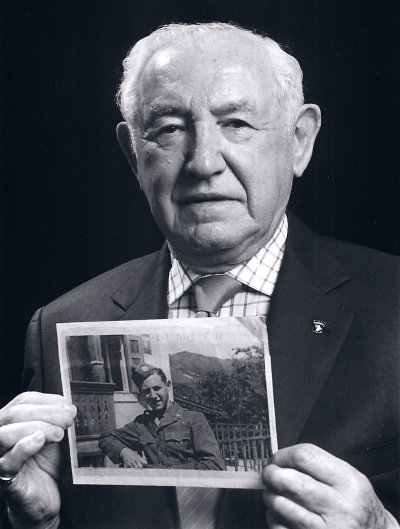
David and Zippi’s relationship lasted several months; at their last meeting, they knew that death might be imminent. It was 1944, more than two years since they were first sent to Auschwitz. The Nazis were sending the last of the prisoners on death marches and getting rid of all the evidence of their crimes. David and Zippi survived much longer than most prisoners but they felt the end was near.
They promised to meet up in Warsaw once the war was over, just in case they made it out.
David was sent to Dachau concentration camp where he was put on a death march. He saw a hand shovel, used it to knock out a Nazi guard, and ran to hide in a barn. The next day, the Americans liberated him.
He started working for the Army and was determined to go to America to sing opera. The dream of meeting Zippi in Warsaw, who also evaded a death march, faded away. Still, they had near encounters, as Zippi was placed in Feldafing, the first all-Jewish displaced persons camp, and David was delivering supplies to the camp.
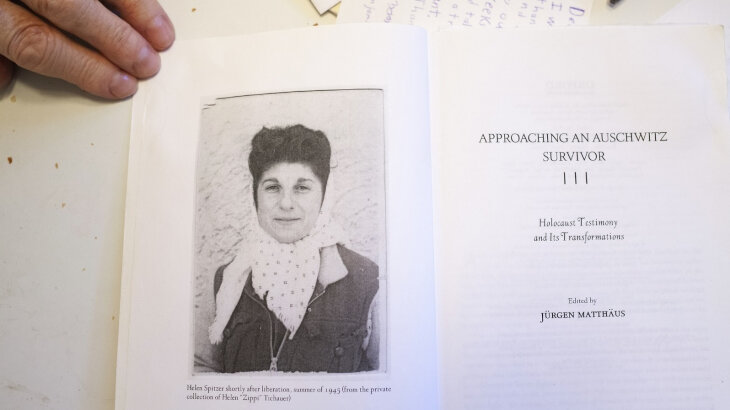 Helen Spitzer, from Mr. Wisnia’s copy of the book of interviews with the woman he knew as Zippi.
Helen Spitzer, from Mr. Wisnia’s copy of the book of interviews with the woman he knew as Zippi.
Zippi ended up marrying a man she met at the camp and settled in New York. She would talk about her experience with historians over the years but never mentioned David. David also married and had four children and six grandchildren. Sporadically, he tried to make contact with Zippi, but it wasn’t until she was on her deathbed that they reunited.
He drove from Levittown, Pennsylvania, where he lived and worked as a cantor, to Manhattan, to see her. They talked for two hours, and even though Zippi was going blind and deaf and suffering from illness, she lit up when she saw David. He finally had the chance to ask her: Did you save me?
“I saved you five times from bad shipment,” she told him, including removing his name from the crematorium list.
Then, she told him, “I was waiting for you.” She had gone to Warsaw to see David, but he never came. She told him she loved him; he told her the same. He sang a song, a Hungarian tune she had taught to him in Auschwitz, and held her hand. Then, the meeting ended.
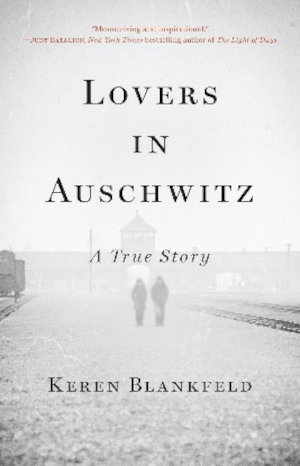
She died at age 100 in 2018, and David died in 2021 at the age of 94.
Blankfeld has a message of hope for readers. “David and Zippi’s story is also a lesson in human resilience and optimism,” she said. “Even in the midst of terror, we have the capability to find love, to develop friendships, and to look for the best in the world. We hold the power to create art, to express love and kindness. It’s important to remain optimistic about the future and never give up hope.”

Love conquers all. Love in the middle of terror, war, and a death camp. They gave each other something to live for and to hold onto. I am happy they reunited even if it was in her deathbed. The sappy, hopeless romantic in me is crying reading this and is satisfied with this ending.
Interesting story. I feel that each person deals with trauma differently. For some, or many, it would take everything they have emotionally, mentally just to survive. For sure I would never even want to start a relationship in hell. I would be focused completely just to survive.
Relationships were often the key to survival. It was often easier to survive when one had someone who cared about them so a lot of people tried to at least team up with someone.My mother often said that she and her mother only survived because they managed (with many challenges) to stay together in Auschwitz and other camps.
This reminds me of the novel "The Penultimate dream" that I'm reading for the 22nd time.It has 472 pages and it's language is Spanish,one of the languages I master.
This needs to be a movie! One of 6 million stories. #WEREMEMBER
Inspirational! Had relatives that had to immigrate from Europe in 1939. Jewish and German intermarriage
A beautiful story. So happy they met up again, before she passed away. Would love to have a copy of the book, even if it is 2nd hand.
Amazing story? I was truly blown away! Would be an amazing movie!
Excelentes historias. Conmovedoras, nos llenan de esperanza de vida, enseñanzas de valentía y amor.